'School defibrillator restarted my heart'
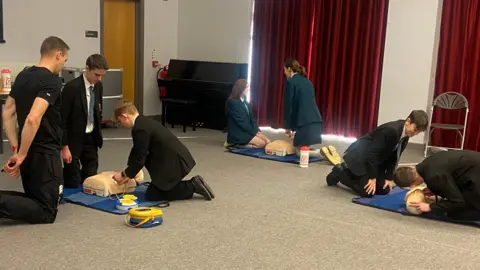 BBC
BBCAll schools in Northern Ireland are to get a defibrillator under plans announced by the education minister.
Paul Givan is expected to spend more than £700,000, which he said would "save lives".
Some schools in Northern Ireland have bought their own defibrillators but about 600 schools do not have one.
In England, all state schools have had the life-saving equipment since 2023.
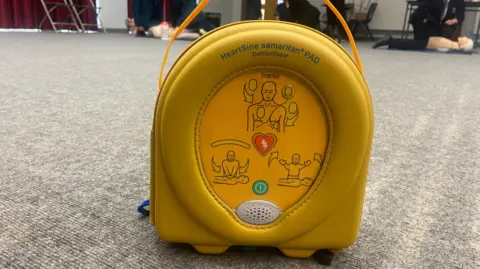
That followed a campaign by the family of Oliver King from Liverpool, who died from a rare heart condition during a school swimming lesson in 2011.
A defibrillator is a device that is used to give an electric shock to the heart of someone who is suffering a cardiac arrest.
As well as funding defibrillators for schools which do not currently have them, Givan also said that the Department of Education will fund batteries and maintenance of the equipment.
All schools, from nurseries to post-primaries, will have a defibrillator as a result of the plan, he told the assembly on Monday.
"This initiative is not just about providing equipment - it is about building a culture of preparedness that complements our work on CPR and awareness of defibrillators within the school curriculum," he added.
"Together we can create a future where no life is lost simply because help did not arrive in time."
The devices are expected to be in all schools by June 2025, the end of the current academic year.
'I just collapsed out of nowhere'
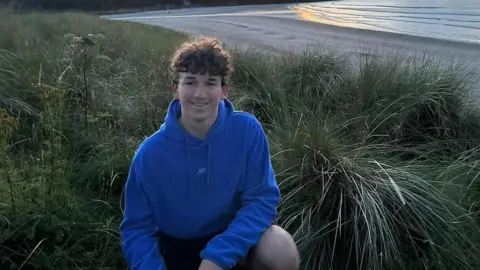 Aaron McGreevy
Aaron McGreevyAt the age of 14, Oliver McGreevy, from Belfast, experienced a cardiac arrest when he was playing rugby with friends in school in April 2023.
“I pretty much just collapsed out of nowhere,” Mr McGreevy told BBC News NI.
“A few of the lads thought I was joking and they very quickly realised I wasn’t. Five or six of my mates managed to get me into the recovery position and they said I swallowed my tongue so they got that fixed, too,” he said.
Unlike many schools in Northern Ireland, Mr McGreevy’s school, Methodist College, already had a number of defibrillators on site.
Staff at the school began CPR and used one of the school’s defibrillators to help restart his heart.
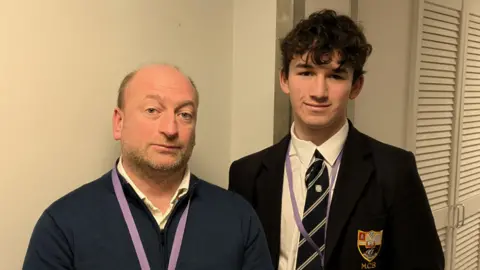
Aaron McGreevy, Oliver McGreevy’s father, said the staff “obviously recognised that it wasn’t a joke and it was something more serious than just a normal collapse”.
“He’s lucky enough to be in a school that has six or seven defibrillators on site. Without the use of defibrillator in the school, simply he wouldn’t be here today,” Aaron McGreevy said.
Paramedics arrived quickly after the teenager collapsed, but he said it was about eight minutes before his heart was restarted.
Defibrillators were used three times on Oliver McGreevy, once with the school defibrillator and twice with the paramedics.
“To be perfectly honest, without the school defibrillator being used on him it would have been too long a delay, he would have been down for too long. It was the defibrillator in the school initially that restarted the heart again to get it back to the proper rhythm,” Oliver McGreevy’s father said.
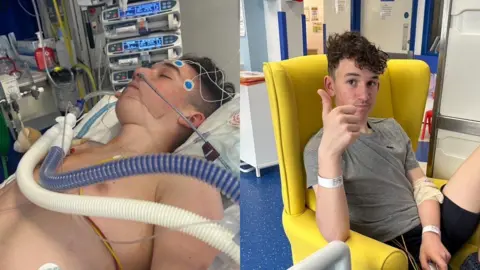 Aaron McGreevy
Aaron McGreevyThe teenager was taken to hospital that afternoon and was sedated for two days before being taken to ICU for a number of days. He was later transferred to a hospital in Dublin where he had an internal defibrillator fitted.
Now 16 years old, Oliver McGreevy said he is now feeling “good” and is back playing sport.
Aaron McGreevy said: “He’s been back surfing over the summer, back playing hockey again and he does what’s called Peak Performance Academy as well.
“I would say he’s not back to his full sporting to any stretch of the imagination but he’s definitely back to doing quite a bit.”
Speaking of the move to introduce defibrillators to all schools in Northern Ireland, Oliver McGreevy said he is “surprised” they aren’t in all schools already.
His father said getting the defibrillators into schools is “fantastic”, but added that it needs to be coupled with early CPR training in schools.
“I think it’s a necessity more than anything else.”
“I understand budget constraints and things like that, but this is just something that I believe is a necessity.”
 Nicola King
Nicola KingLucy King is from Limavady and was 13 when she collapsed at her family home after a cardiac arrest in February 2020.
She had been asleep and was at home with her mum, Nicola, dad, Richard, and siblings, Thomas and Olivia, when the incident happened.
Her life was saved by the quick actions of her parents, who performed CPR, and her brother who ran to a local shop in his pyjamas to get a defibrillator.
“Without the defibrillator she wouldn’t be here today,” Nicola King told BBC Radio Foyle’s North West Today programme.
“The ambulance arrived, they worked on Lucy and she needed to be shocked twice,” she said.
Nicola said nothing can ever prepare you for a moment like that as a parent and said improving access to defibrillators will help save lives.
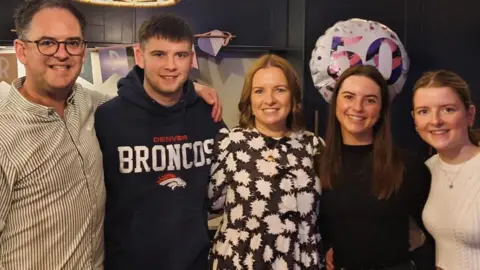 Nicola King
Nicola KingLucy said she was incredibly fortunate that there was a defibrillator located so close to her when she needed it and is now happy and healthy again.
“I was just 13 when it happened and I had to learn to talk and walk again,” she said.
“Life is good again – I have a part-time job and I am on my second year studying Health and Beauty.”
CPR and defibrillators in schools
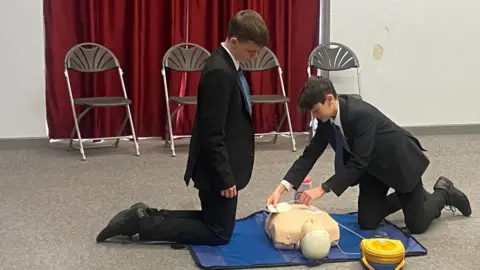
It is now compulsory for some post-primary pupils in Northern Ireland to learn about CPR and defibrillators in the Learning for Life and Work subject, as a result of legislation passed in March 2022.
The Council for the Curriculum, Examinations and Assessment has a range of lessons for schools about what is called the Community of Lifesavers programme.
CPR is a life-saving medical procedure which helps to pump blood around the body when the heart is unable to do so.
John Deery recently told BBC News NI about how he survived a cardiac arrest while running the Belfast Marathon in May. His heart stopped for six minutes.
Members of the crowd watching the marathon used a defibrillator and cardiopulmonary resuscitation (CPR) to save Mr Deery's life.
The British Heart Foundation charity has called on everyone who has a defibrillator, whether in a public place, business, or community, to register it and be involved in creating a map of 100,000 defibrillators.
